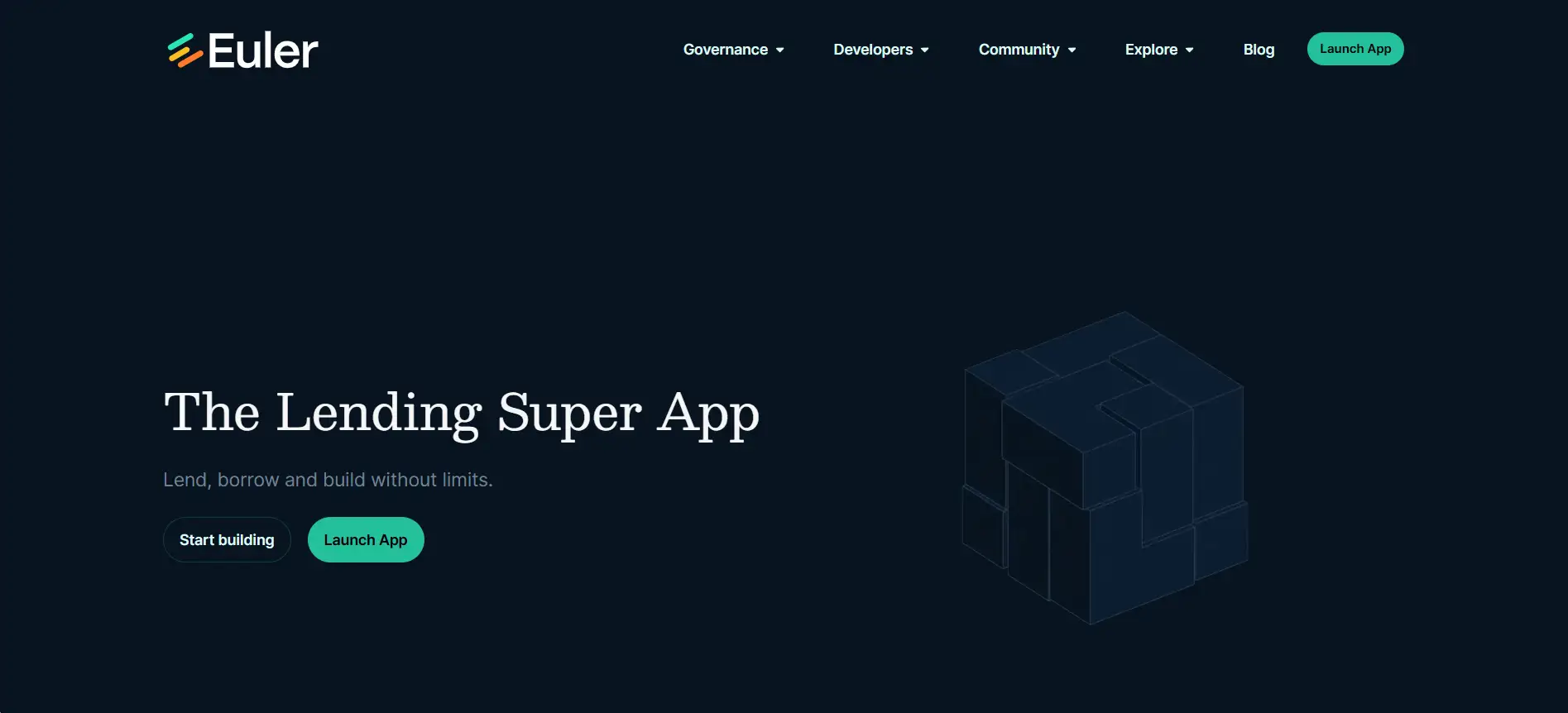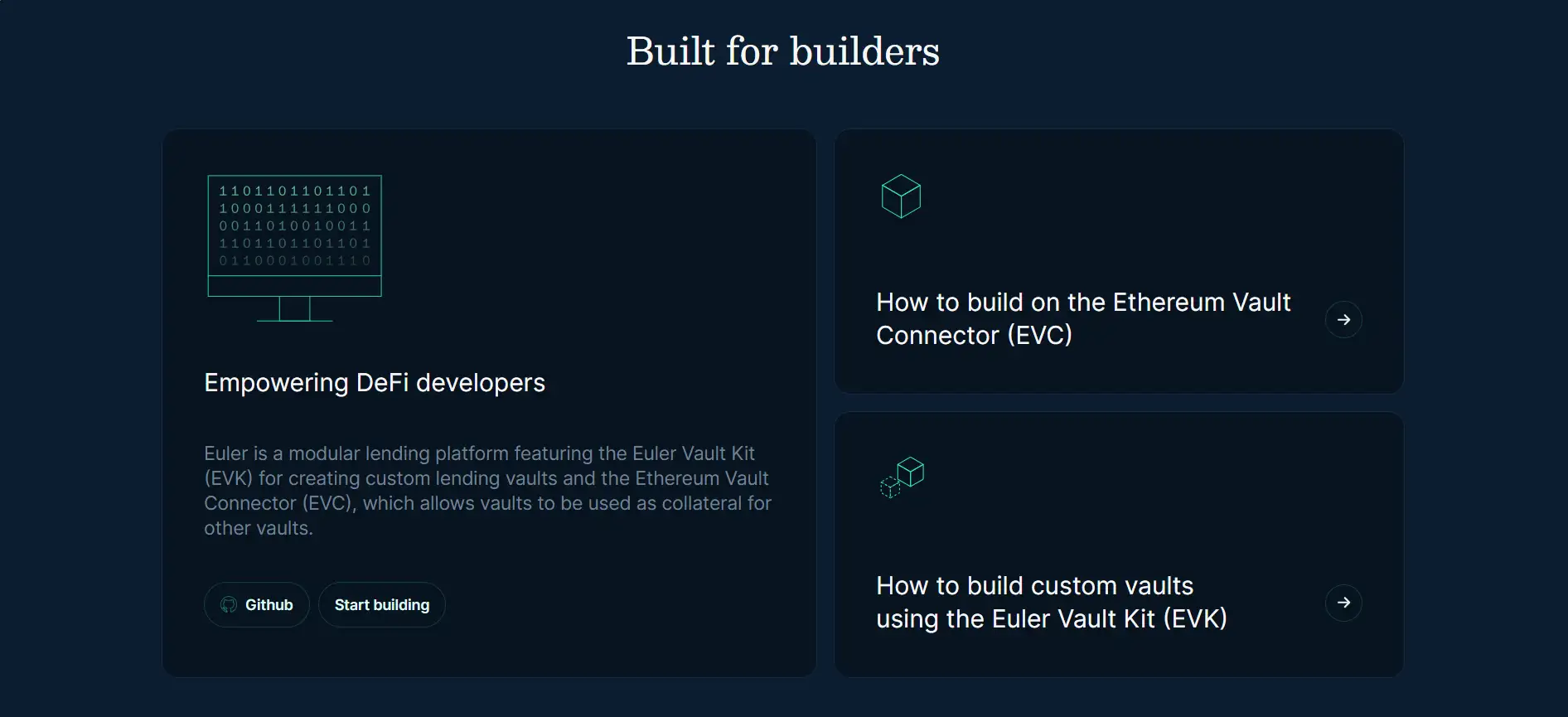About Euler Finance
Euler Finance is a next-generation lending protocol designed to unlock deep flexibility and composability in the world of decentralized finance. At its core, it allows users to lend, borrow, and build on a permissionless platform with unmatched modularity. By leveraging customizable vaults, on-chain risk curation, and cross-collateralized lending mechanics, Euler Finance redefines the boundaries of on-chain capital efficiency.
With tools like the Euler Vault Kit (EVK) and the Ethereum Vault Connector (EVC), developers can deploy personalized lending markets and build scalable DeFi applications with ease. Whether you're a passive lender, advanced DeFi strategist, or protocol builder, Euler Finance empowers you to interact with credit markets using dynamic strategies while maintaining full control over your collateral and risk profile.
Euler Finance is a modular, decentralized lending protocol that enables users to lend, borrow, and build financial products with unprecedented flexibility. Operating on Ethereum, Euler supports a range of sophisticated use cases from isolated lending markets to complex cross-collateralized vault structures. Its composable architecture is centered around the use of ERC-4626 vaults, which standardize the way assets and strategies interact across the platform.
The core innovation behind Euler V2 is the separation of collateral and debt through modular vaults. These vaults can be linked to form sophisticated credit markets tailored for retail users, DAOs, or institutional players. With credit vaults and earn vaults as the foundation, the protocol allows users to either borrow directly, stake collateral for future borrowing, or participate in curated yield strategies managed by trusted curators. Vaults can be either governed or immutable, enabling participants to choose the level of risk and decentralization that suits them best.
For developers, Euler Finance offers robust tools including the Euler Vault Kit (EVK) and the Ethereum Vault Connector (EVC). The EVK allows builders to deploy custom credit vaults with tailored risk and lending parameters. The EVC enables advanced composability by allowing vaults to be used as collateral within other vaults—an innovation that enables seamless batching of complex transactions. These tools are audited, open-source, and built to support the next wave of DeFi innovation.
Users can explore earning opportunities by depositing into Earn Vaults, borrow against collateral with risk-adjustable parameters, and even create leveraged positions using the Multiply module. All interactions—whether lending, borrowing, or multiplying—are fully permissionless and integrated with simulation tools, allowing users to test out strategies before execution. The platform also supports advanced functionality like transaction batching, spy mode to monitor any address, and robust position management dashboards.
EUL, the platform's native governance token, plays a key role in shaping the ecosystem. It allows holders to participate in community governance via Snapshot and Tally, vote on protocol upgrades, manage treasury allocations, and set policy through the Euler DAO. EUL can also be staked in various protocol mechanisms, including Fee Flow auctions and third-party incentive layers. The token has a fixed supply of 27,182,818—symbolic of Euler’s number, “e.”
Since its inception, Euler Finance has been backed by industry leaders including Paradigm, Coinbase Ventures, and Jane Street. It has become a key infrastructure layer for DeFi protocols looking to build lending mechanisms or utilize vault-based collateralization. Similar platforms include Aave and Compound, but Euler's modular vault architecture, vault-to-vault collateralization, and transaction batching offer a distinctive approach to decentralized finance infrastructure.
Euler Finance offers a wide range of benefits and features that cater to both users and developers in the DeFi lending ecosystem:
- Modular Lending Architecture: Build custom lending and borrowing markets using ERC-4626-compliant credit vaults, allowing total flexibility in collateralization, interest models, and governance.
- Vault-to-Vault Collateralization: Through the Ethereum Vault Connector (EVC), vaults can be used as collateral for other vaults, enabling complex and composable credit structures without added risk.
- Transaction Batching & Simulation Mode: Execute multiple transactions in a single batch using the built-in transaction queue, and test them beforehand using on-chain simulation mode to avoid errors.
- Earn, Borrow & Multiply Modules: Users can lend for passive income, borrow against diverse collateral types, or open leveraged positions with advanced automation—all from one interface.
- Vault Kit for Developers (EVK): Create fully custom, immutable vaults with tailored risk and fee parameters using the open-source Euler Vault Kit, empowering DeFi protocol builders.
- Permissionless Market Deployment: Anyone can launch new vaults and markets within the Euler ecosystem without needing approval—true decentralization at its core.
- Protocol-Driven Yield Generation: Earn Vaults allow curators to allocate deposits into yield strategies across the protocol or external products, optimizing returns for passive users.
- DeFi Ecosystem Integration: Euler integrates with third-party tools like DeFi Saver, Gauntlet, Dune, and Superlend, maximizing reach and usability.
Euler Finance offers a seamless user experience for earning, borrowing, and building in DeFi. Here's how to get started on Euler Finance:
- Visit the App: Go to app.euler.finance and connect your EVM-compatible wallet such as MetaMask or WalletConnect.
- Explore the Earn Tab: Head to the Earn page to supply supported tokens and start earning interest instantly. View market parameters, APYs, and risk metrics before committing.
- Open a Borrow Position: Visit the Borrow tab to supply collateral and borrow assets against it. Monitor LLTV ratios, liquidity, and risk data for every pair.
- Create a Leveraged Position: On the Multiply page, choose an asset pair to loop your collateral and amplify exposure using Euler's built-in swap and borrow mechanics.
- Track Your Positions: Use the Portfolio dashboard to view Net Asset Value (NAV), open positions, health scores, and reward accruals across all accounts.
- Batch & Simulate Actions: Use the sidebar queue to create multi-step transaction batches, and toggle simulation mode to preview on-chain outcomes before signing.
-
Use Spy Mode: Add
?spy=[ADDRESS]to any app URL to view another wallet’s on-chain positions—perfect for research, support, or account mirroring. - Join the Community: Connect with other users and devs on the Euler Discord, or contribute via GitHub and the Governance Forum.
Euler Finance FAQ
Euler Finance enables advanced composability by allowing vaults to be used as collateral for other vaults. This is made possible by the Ethereum Vault Connector (EVC), which defers vault checks until after a batch of transactions is executed. This means users can leverage positions across multiple assets or strategies in a single transaction, enabling more complex and capital-efficient DeFi strategies on Euler.
Yes. With the Euler Vault Kit (EVK), developers can deploy fully custom lending vaults with tailored parameters such as risk settings, interest models, and governance status. Whether you're building isolated markets or integrating into a larger protocol, Euler provides the tools and infrastructure to launch your own permissionless DeFi lending solution.
When your health score falls under 1.00, your account becomes eligible for liquidation. This means your collateral can be partially sold to repay debt and restore solvency. To avoid this, you can either supply more collateral or reduce your debt. Euler offers an intuitive Portfolio dashboard and Account page to monitor your health score and act before liquidation risk escalates.
Transaction batching on Euler allows you to combine multiple actions (e.g., supplying collateral, borrowing, swapping) into a single transaction. This saves gas and simplifies workflows. The simulation mode lets you preview results before execution, ensuring accuracy and confidence in complex strategies like leveraging or refinancing across vaults.
Absolutely. Euler Finance is built with modularity, composability, and security at its core. With support for audited vaults, transaction simulation, and permissionless market deployment, it's ideal for building institutional-grade DeFi products, DAOs, or yield strategies. Risk dashboards from platforms like Gauntlet and analytics from Dune further enhance transparency and reliability.
You Might Also Like












